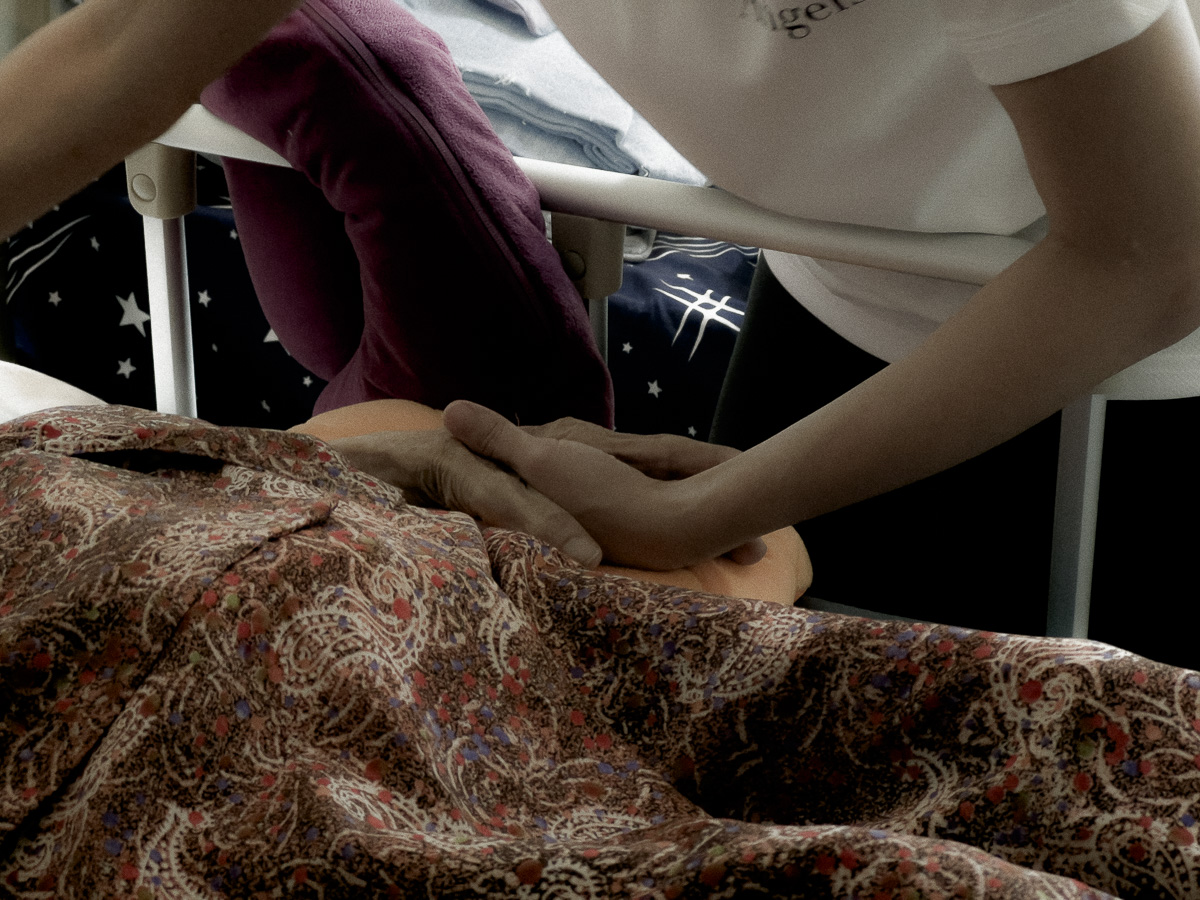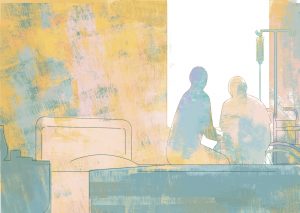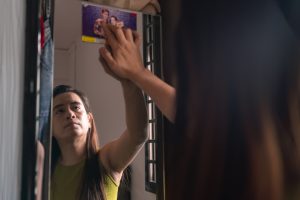All images: Zat Astha/Rice Media
A small television chatters in the background with old reruns on Channel 8 starring the likes of Mark Lee and Henry Thia getting up to their usual mischief. On the wall, a fan cools the space where 95-year-old Mdm Pay lays on a hospital bed clad in a sepia-coloured printed set emblematic of women her age.
She is softly roused from her slumber as Nurse Amy Lim and volunteers Rachel and Linda from Vigil Angels begin the process of cleaning her. Armed with a small basin, towels, and small bottles of essential oils, the trio moves slowly, almost recitative, around Mdm Pay. They speak in hushed tones, carefully choosing their words to reflect a reverence for the task ahead.
My mornings don’t typically look like this; in fact, it began a little cold and rainy when I made it down to HCA Hospice’s office in Woodlands that Thursday morning. Upon my arrival, Nurse Amy greets me warmly and ushers me into the meeting room to wait for two other volunteers who would be helping her today.
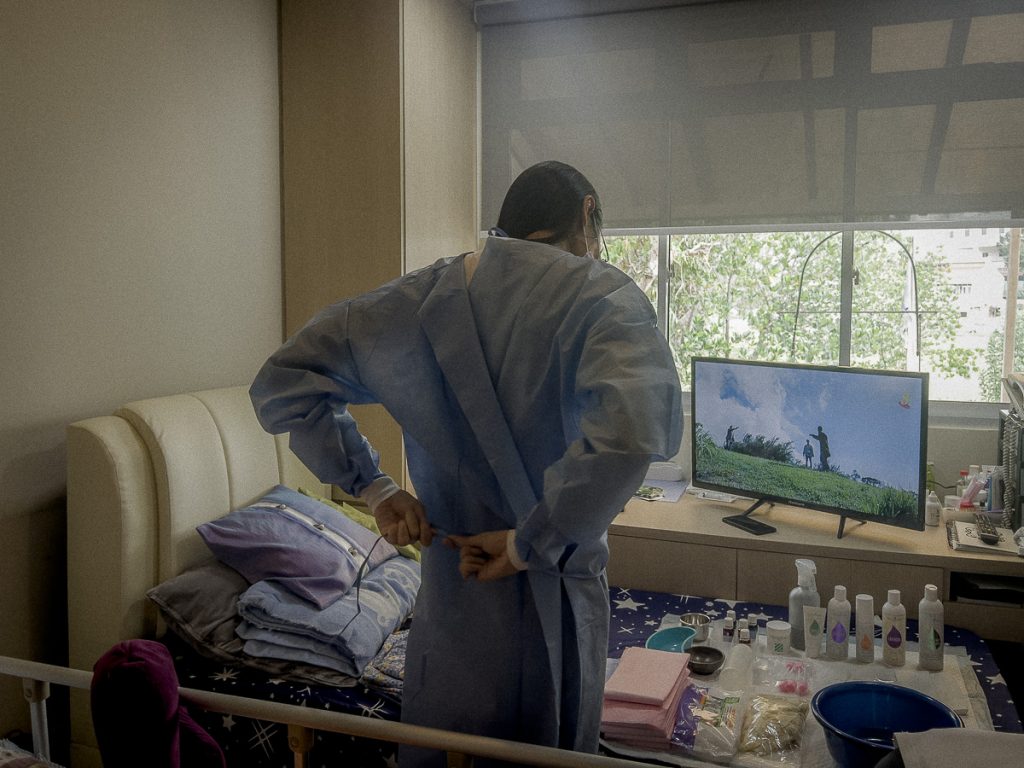
The unique space Vigil Angels occupies
Besides her role as a nurse educator for HCA, Nurse Amy and her colleague also run a volunteer program called Vigil Angels. Vigil Angels is a volunteer program that can be classified as a spin-off (if you will) from No One Dies Alone (Noda). Noda is a program originating from the States that engages volunteers to provide companionship to patients in hospice care who are dying and have few friends or family members.
Unlike Noda, Vigil Angels is not conducted in hospices or in-patient facilities but in the homes and rooms of those who are about to pass. These are patients who have opted for home hospice care and chose HCA as their providers. Their HCA nurse will then refer the patient to the services of Vigil Angels who will come by the home to do a thorough and (often) final cleaning of the patient.
What Vigil Angels does can be said to be both a tactile and spiritual endeavour. This process involves washing the patient’s hair and body, putting on a fresh change of clothes, attending to their dressings and tube care and swapping out the bed sheets for new ones. It is also important there is no extra charge for the patient.
“We are very mindful of the spiritual state of this person we are attending to now,” underlines Nurse Amy.
“Some patients will snap at me with a ‘What do you think? Can I be good? With a terminal illness like that, how can I possibly be good?’”
With over thirty years of general nursing experience and having worked in O&G (obstetric and gynaecological) before joining HCA, Nurse Amy Lim thought she had seen and learned it all—until she entered the world of palliative care.
“I thought coming to end-of-life care would be very easy,” she chuckles in an earlier interview, “I thought, at this point, there is nothing much to really worry over, you know. Lo and behold, I realise there’s so much to learn and pick up.”
As empathetic and compassionate as Nurse Amy is, there are moments with her patients when she is reminded being in palliative care is a constant learning experience.
“I realised some very harmless questions are actually not quite harmless. I mean, when you go and visit a patient, you would say something like, ‘How are you today? Or how have you been? I thought these are quite natural and innocuous,” shares Nurse Amy. “But some patients will snap at me with a ‘What do you think? Can I be good? With a terminal illness like that, how can I possibly be good?’”
Relatively innocent questions can come across as grossly insensitive, and it is a constant balancing act ensuring you dole out the ‘correct’ amount of warmth and detachment each time. Being highly sensitive to a patient’s needs and tailoring her care is perhaps the hallmark of palliative care.
Indeed, there’s more to dying than merely reaching the finish line of death alone.
A need for Vigil Angels
At HCA’s office, Nurse Amy is lithe, smiley, and exudes a calm, serene air that nurses often have that puts you at ease immediately. She kindly offers to make me some hot tea; her chipper attitude belies the fact that death is all but a common occurrence to her.
Still, as much as it is preferred for some patients to choose to die at home, the decision presents a distinctive set of challenges for both caregivers and patients.
“One particular research paper that had interviewed many patients and caregivers found that cleanliness is very important to both parties,” explains Nurse Amy.
Nurse Amy and her colleagues at HCA have observed towards the end, that when a patient reaches a state where they are frail and mostly semi-conscious, and cannot communicate properly, even the most well-trained caregivers will be more anxious to give them a proper clean.
“Even to turn the patient a little or lift the patient’s arms, they might let out that groan to show that it is painful, even if for a moment. It might even indicate some other things,” she continues. “This will instinctively worry the caregiver. They will be thinking, ‘Am I doing this right?’”
“They are afraid that they will hurt the patient. So, they just do what they can.”
As a patient moves towards the actively dying phase, HCA found that caregivers’ anxiety and emotional states are naturally heightened.
“We know surely that if you’re in that headspace of being very anxious with a lot to worry over, you can’t remain calm or think right all the time,” Nurse Amy says calmly. Still, when it comes to caring for your loved ones in such a delicate state, blindspots are inevitable, which is where Vigil Angels come in.
To minimise causing more pain and suffering to the patient, caregivers might lessen and shorten some aspects of the patient’s personal care routine, such as bathing or brushing their teeth. “It’s because they are afraid that they will hurt the patient. So, they just do what they can,” explains Nurse Amy.
Besides assuaging some caregiver stress, Vigil Angels is also mindful of how they preserve a patient’s dignity at this stage of their life.
“Image and self-perception are still very important—all of us hold image very significantly,” Nurse Amy emphasises. She recalls some cases with cancer patients where the disease has altered much of their appearance, and they feel extremely despondent and only want the end to come quicker.
“Everybody needs a good bath to feel comfortable. So, how can I bring the toilet to the patient and make it all feasible?” continues Nurse Amy.
Unlike Noda volunteers, who have the opportunity to interact with dying patients multiple times, Vigil Angels usually only have one session with the patient and their family. For that reason, Nurse Amy and her volunteers make sure it counts.
The prep work before meeting the patient
I sip my tea in one of the meeting rooms of HCA, and before long, both volunteers, Rachel Leung and Linda, arrive at the office. Nurse Amy wheels out a small suitcase of specially curated products that are essential for her session today.
She opens the suitcase—it is packed carefully with essential oils, bath products, easy-to-wear clothing, and hospital underpads, to name a few. Before going to the patient’s house, Nurse Amy briefs Rachel and Linda on what they can expect from today’s case.
Mdm Pay Tui was on a routine health check when the doctors discovered she had advanced lung cancer. Due to her age, her family has decided not to pursue any treatment and for her to live out her days at home.
Besides the patient’s health status, Nurse Amy details Mdm Pay’s family and living conditions, citing a multi-generational household and no issues with their finances. Rachel and Linda nod, almost in unison, as Nurse Amy zips up the nifty suitcase and heads towards the private-hire car waiting at the shelter just outside the office.
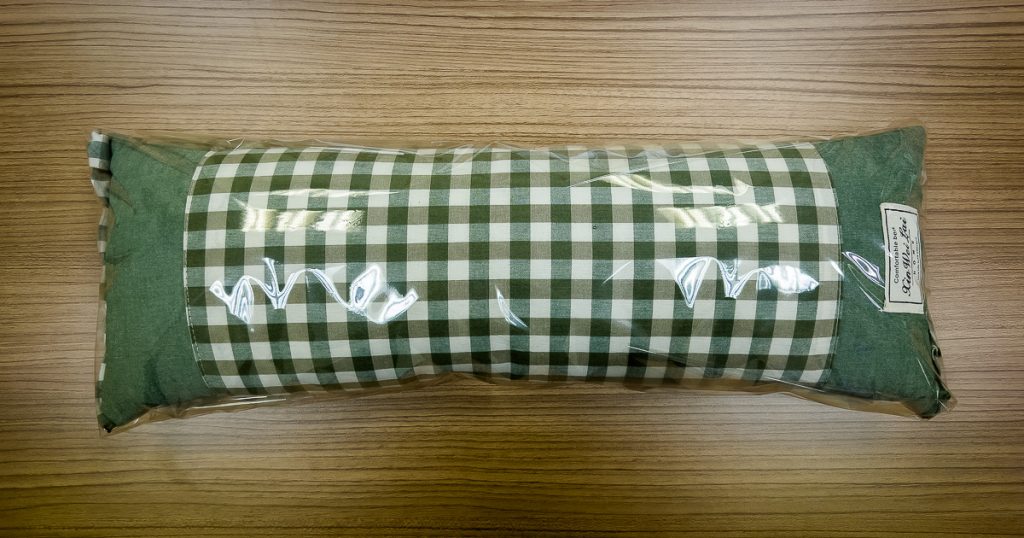
Meeting Mdm Pay Tui’s family
Thirty minutes later, after battling the usual morning traffic, we arrived at a quiet landed housing estate where the foliage grew wild and untamed in some parts. Others had taken home gardening quite seriously with melon and cucumber vines curling up a trellis.
Just like the other homes, Mdm Pay’s house was distinct in its way. A small brass gong stood at the front of the property alongside a porcelain Chinese garden table with two lone stools. Colourful Tibetan prayer flags hung by the entrance flutter in the breeze.
“I’ll lead the way,” says Nurse Amy as she enters the house and greets Mdm Pay’s granddaughter, Ying Jie. Ying Jie is accompanied by her mother (Mdm Pay’s daughter-in-law) and her aunt (Mdm Pay’s daughter), both women in their late 50s who have been taking care of Mdm Pay since she fell ill.
As a practice, Nurse Amy makes it a point to know her patient and requests the family members to tell her everything they can about the patient. All the details matter, from where they were born, how long they were married, the number of grandchildren, to their favourite Taiwanese dramas.
“I’m coming into a very, very private space. When you think of dignity and our humanity, how would you feel if someone were to strip and clean you?” she explains. “Knowing the patient’s life story would help me connect on a deeper level with this person who now cannot communicate with me. Learning about their life helps me do my duty in the most honourable and respectful manner,” shares Nurse Amy.
“When I wash this pair of hands, I know what they have done in their lifetime. When I wash their feet, I know the journey this person has also travelled. You know, the smooth, the rough, and the tough.”
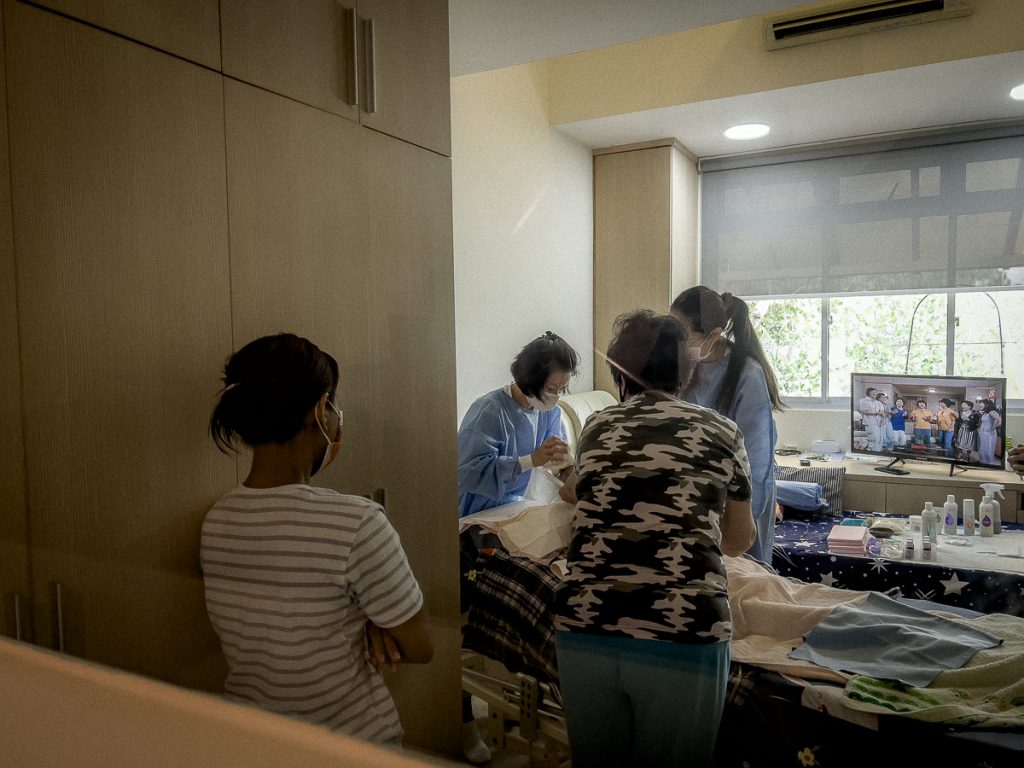
The women at the table begin telling stories about a resilient woman who lost her husband early into the marriage but still raised her children all the same. They say she was a kind mother-in-law and a wonderful grandmother, each heartwarming tale melding into one another.
Besides recounting Mdm Pay’s life, Nurse Amy uses the time to ask the family how they would like to remember her. Here, fond memories bubble up with special moments each woman shared with Mdm Pay. You can tell that it’s a cathartic process as they speak about Mdm Pay in her prime, often chortling at her various antics.
Nurse Amy listens intently, nodding and marvelling at appropriate moments. Indeed Mdm Pay has led quite the full life.
Nurse Amy begins to gently probe about her current condition. Ying Jie’s aunt speaks about her mother’s easygoing nature and how she was not one to complain when things got tough or when she would fall sick. Ying Jie’s mother chimes in and explains how her health had severely deteriorated after a fall.
Now, near the end of her journey, Mdm Pay cannot communicate much of her needs. This revelation inevitably brings tears to all their eyes as we all nod along sympathetically. The pressure, strain, and helplessness of caring for someone actively dying weigh heavily on their shoulders.
Nurse Amy recognises the tears and is all too familiar with the ins and outs of caregiver stress. She holds Ying Jie’s aunt’s hands and offers firm and comforting words before asking permission to proceed to the room where Mdm Pay waits.
Meeting Mdm Pay Tui
Clasping Mdm Pay’s hand, Nurse Amy softly introduces herself and tells her the purpose of the visit. The rest of us follow suit and let Mdm Pay know of our presence.
Earlier at the office, Nurse Amy shared that when dealing with patients so close to death’s door, there have been times when the patient passes away in the middle of the session. To that end, Nurse Amy would properly assess the patients and ensure caregivers and family members are well aware of the possibility. She also asks if there are any religious rites the patient’s family would like done should the inevitable happen.
For now, Mdm Pay is strong enough and will last through the session, Nurse Amy reports. Nurse Amy, Linda, and Rachel don their PPE gowns, arrange their various apparatuses, and spritz the room with their unique blend of essential oils.
The work begins.
“Touching can be very comforting”
Nurse Amy, Linda, and Rachel move methodically and slowly, first removing Mdm Pay’s clothing and then covering her with a towel. What would usually take barely a minute to do for a patient who is well takes much longer with someone who has little to no agency over her bodily movements.
Then, they rub some frankincense oil on her chest and upper body to soothe any muscular aches and pains. Nurse Amy urges Mdm Pay’s family members to watch the process as this might help them in subsequent cleanings.
Linda then starts to wash her hair, placing a small blue basin nearby so she can quickly rinse the towel when it’s soaked through. Warm water is slowly and carefully dripped onto Mdm Pay’s whisper of silver hair and lathered up.
Using the lightest touch, Linda rubs her head in slow circular motions. Rachel looks out for any signs of discomfort. It’s not exactly a day at the salon, but the effects are all the same. We aren’t sure at first, but soothed by the massage, a weak but sure smile slowly breaks on Mdm Pay’s face,
With carefully positioned bags, hospital sheets, and spray bottles, the team is able to give her a well-deserved head scrub that leaves her feeling and looking visibly fresh. With another change of towels and water, the team gently cleanses Mdm Pay’s face with languid sweeps from the warm wash cloth and cleanser.
Unhurried, careful, and thorough
They are unhurried as they wipe the top half of her body down with the wet cloth and then the warm. Rachel and Linda keep an eye on Mdm’s Pay’s expression, constantly ensuring she is comfortable, mindful of her slightly swollen right arm and friable skin. They start with her arms and her fingers, Rachel running back and forth to the toilet for a quick top-up of lukewarm water.
Without anyone even noticing, one hour passes. Unlike most medical procedures, time is not of the essence when it comes to what Vigil Angels do. They will take as long as they need to finish the sacred work.
The team moves on to her torso, cautiously lifting her arm and giving it a careful wipe down and a massage. The water is infused with Nurse Amy’s blend of essential oils, from calming, soothing notes of lavender, cypress, and marjoram to the more invigorating basil and peppermint.
These scents permeate the air as the warm water cleanses each of Mdm Pays folds. At times, either Mdm Pay’s daughter-in-law or daughter will intermittently hold her hand during the procedure and talk her through each step.
They now move on to her mouth. Nurse Amy whips out her phone and shines the flashlight in Mdm Pay’s mouth for an inspection.
With a splash of Oral-7 mouthwash and an oral sponge, Nurse Amy makes several sweeps around Mdm Pay’s mouth, taking her time to dislodge any debris or dried food that might cause her discomfort. Oral care is often neglected when one is in this state, as comfort is of the utmost priority. Cleaning an oral cavity can be quite invasive, no matter how careful the approach is.
Mdm Pay winces; Nurse Amy coos a quick apology and continues. She stresses that when one is dying, the mouth is often parched, so if not taken care of properly, it is uncomfortable for the patient.
At the two-hour mark, the team starts preparing to clean Mdm Pay’s back. Like a well-oiled machine, Linda lifts and supports Mdm Pay’s body while Rachel wipes her down as Nurse Amy checks on any wounds or pressure sores.
The cleaning ends with a thorough cleaning of Mdm Pay’s feet and hands. Linda shows me the dried skin on her feet, explaining that she may have to spend a little more time to ensure all the dead skin is properly exfoliated.
As she does this, Rachel and Nurse Amy teach the family members how to massage Mdm Pay’s acupoints to make her feel calm and at ease. When it comes to patients who are ill, many would often think that a massage should serve a healing objective. Few realise that a massage for someone so close to death can be more holistic in nature.
“Most people don’t realise that the patient can still experience being loved, being touched—this is basic humanity. Also, the family can see that if a group of strangers can come in and do this basic cleaning, they can do it too.”
Ying Jie’s aunt brings out a periwinkle set dotted with small brightly coloured flowers. The goal of Vigil Angels is for the patient to come out of the session not just feeling and smelling good but to look good too.
Rachel and Linda help slip it on; her demeanour is visibly happier. With a fresh set of clothes, hair slicked back, skin bright and moisturised, Mdm Pay looks like a completely different person from the patient we saw three hours ago.
Ying Jie and her family feel encouraged by such a positive change in Mdm Tay, observing that the mood in the room shifts and everyone is lighter and happier.
“The hallmark of palliative care is being sensitive to the needs of the patient,” says Nurse Amy. “I learned over the years that I’ll go in, quieter, listen to what matters most to them, what distresses them and how I can make them feel a little more comfortable today.”
When it is time to go
Nurse Amy and her volunteers pack their supplies in the suitcase and tuck Mdm Pay in, who is now sleeping soundly. We say our goodbyes to the family who is grateful and bolstered by the experience.
Linda and Rachel roll the suitcase out and wait for the hired car to bring them back to HCA.
Dealing with death brings with it a certainty and inevitability that we can more or less count on. In this somewhat liminal space, Vigil Angels finds a home; it doesn’t shy away from the conclusion but ensures the send-off is done in the most dignified way possible.
“For anyone of us doing hospice work, you have to recognise that to be able to care for someone who is dying is the highest privilege in life,” observes Nurse Amy solemnly. “Once you’re convinced this job is a blessing and an honour, you accept death as a part of life. Where there is birth, there is death.”
Two days later, Nurse Amy informed me Mdm Pay had passed away peacefully at home.

